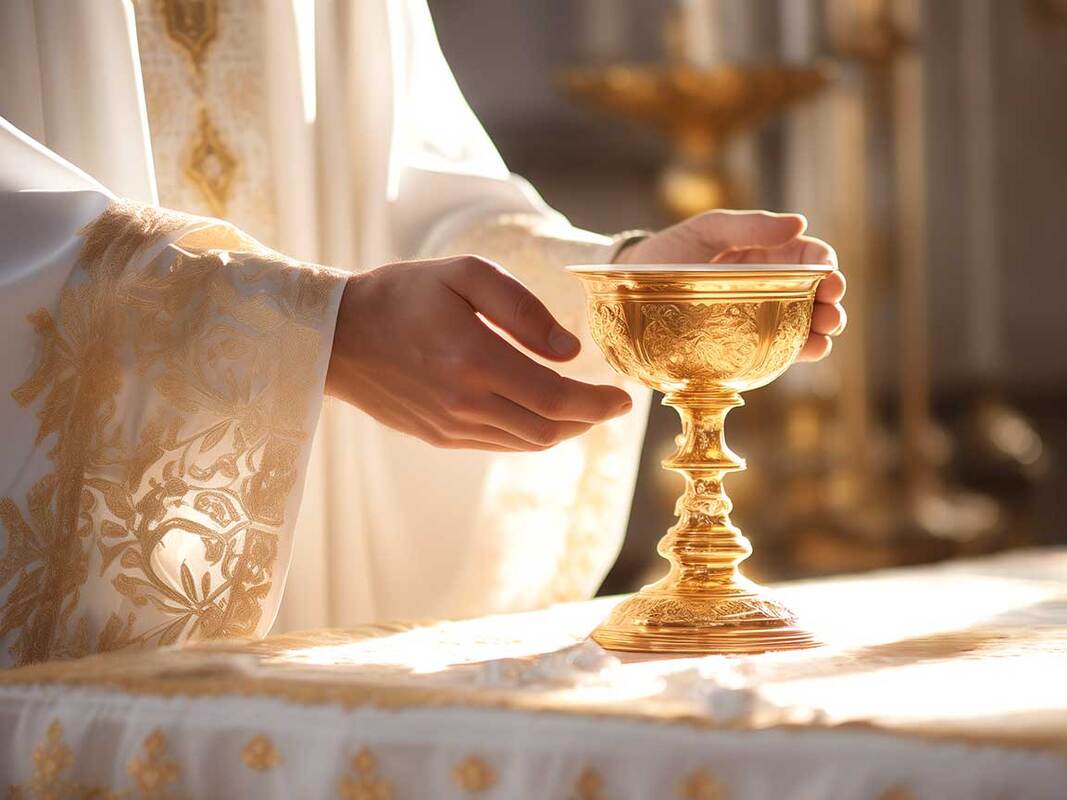|
For youth First Communion,
please contact the Parish Office at 708-447-1020. For adult First Communion, please email Deacon Randy Belice or call the Parish Office at 708-447-1020. "The other sacraments, and indeed all ecclesiastical ministries and works of the apostolate, are bound up with the Eucharist and are oriented toward it." The liturgical life of the Church revolves around the sacraments, with the Eucharist at the center (National Directory for Catechesis, #35). At Mass, we are fed by the Word and nourished by the Body and Blood of Christ. We believe that the Risen Jesus is truly and substantially present in the Eucharist. The Eucharist is not a sign or symbol of Jesus; rather we receive Jesus himself in and through the Eucharistic species. The priest, through the power of his ordination and the action of the Holy Spirit, transforms the bread and wine into the Body and Blood of Jesus. This is call transubstantiation.
By the consecration the transubstantiation of the bread and wine into the Body and Blood of Christ is brought about. Under the consecrated species of bread and wine Christ himself, living and glorious, is present in a true, real, and substantial manner: his Body and his Blood, with his soul and his divinity. (CCC 1413) So rich is the mystery of the Eucharist that we have a number of terms to illumine its saving grace: the Breaking of the Bread; the Lord’s Supper; the Eucharistic Assembly; the Memorial of Christ’s Passion, Death, and Resurrection; the Holy Sacrifice of the Mass, the Holy and Divine Liturgy; the Eucharistic Liturgy; Holy Communion; and Holy Mass (cf. CCC, nos. 1328-1332). The New Covenant I am the living bread that came down from heaven; whoever eats this bread will live forever;…Whoever eats my flesh and drinks my blood has eternal life and…remains in me and I in him. (John 6:51, 54, 56) When Jesus instituted the Eucharist he gave a final meaning to the blessing of the bread and the wine and the sacrifice of the lamb. The Gospels narrate events that anticipated the Eucharist. The miracle of the loaves and fish, reported in all four Gospels, prefigured the unique abundance of the Eucharist. The miracle of changing water into wine at the wedding feast in Cana manifested the divine glory of Jesus and the heavenly wedding feast in which we share at every Eucharist. In his dialogue with the people at Capernaum, Christ used his miracle of multiplying the loaves of bread as the occasion to describe himself as the Bread of Life: “I am the living bread that came down from heaven… Unless you eat the flesh of the Son of Man and drink his blood, you do not have life within you” (Jn 6:51, 53). In the gospels we read that the Eucharist was instituted at the Last Supper. This is the fulfillment of the covenants in the Hebrew Scriptures. In the Last Supper narratives, Jesus took, broke and gave bread and wine to his disciples. In the blessing of the cup of wine, Jesus calls it “the blood of the covenant” (Matthew and Mark) and the “new covenant in my blood” (Luke). This reminds us of the blood ritual with which the covenant was ratified at Sinai (Ex 24) -- the sprinkled the blood of sacrificed animals united God and Israel in one relationship, so now the shed blood of Jesus on the cross is the bond of union between new covenant partners -- God the Father, Jesus and the Christian Church. Through Jesus’ sacrifice, all the baptized are in relationship with God. The Catechism teaches that all Catholics who have received their First Holy Communion are welcome to receive Eucharist at Mass unless sin a state of mortal sin. Anyone who desires to receive Christ in Eucharistic communion must be in the state of grace. Anyone aware of having sinned mortally must not receive communion without having received absolution in the sacrament of penance. (CCC 1415) The Church warmly recommends that the faithful receive Holy Communion when they participate in the celebration of the Eucharist; she obliges them to do so at least once a year. (CCC 1417) Receiving the Eucharist changes us. It signifies and effects the unity of the community and serves to strengthen the Body of Christ. |
Locations & Contact information
|
Quick LinksMass Schedule
Calendar New to St. Paul VI? Staff Directory Baptism Marriage Funerals Bulletins Donate Archdiocese Covid-19 Updates Connect With UsSearch our site |
© St. Paul VI Parish
Site powered by The Archdiocese of Chicago



